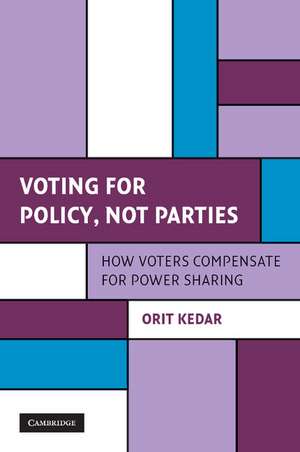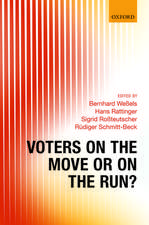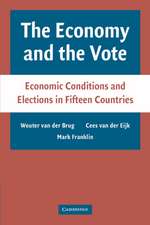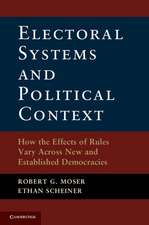Voting for Policy, Not Parties: How Voters Compensate for Power Sharing: Cambridge Studies in Comparative Politics
Autor Orit Kedaren Limba Engleză Paperback – 2014
| Toate formatele și edițiile | Preț | Express |
|---|---|---|
| Paperback (1) | 283.79 lei 6-8 săpt. | |
| Cambridge University Press – 2014 | 283.79 lei 6-8 săpt. | |
| Hardback (1) | 679.94 lei 6-8 săpt. | |
| Cambridge University Press – 13 dec 2009 | 679.94 lei 6-8 săpt. |
Din seria Cambridge Studies in Comparative Politics
-
 Preț: 233.13 lei
Preț: 233.13 lei -
 Preț: 267.61 lei
Preț: 267.61 lei -
 Preț: 239.36 lei
Preț: 239.36 lei -
 Preț: 185.64 lei
Preț: 185.64 lei -
 Preț: 160.82 lei
Preț: 160.82 lei -
 Preț: 206.52 lei
Preț: 206.52 lei - 9%
 Preț: 594.68 lei
Preț: 594.68 lei -
 Preț: 225.70 lei
Preț: 225.70 lei -
 Preț: 164.94 lei
Preț: 164.94 lei -
 Preț: 206.71 lei
Preț: 206.71 lei -
 Preț: 236.42 lei
Preț: 236.42 lei -
 Preț: 358.38 lei
Preț: 358.38 lei -
 Preț: 231.82 lei
Preț: 231.82 lei -
 Preț: 257.82 lei
Preț: 257.82 lei -
 Preț: 264.74 lei
Preț: 264.74 lei -
 Preț: 269.58 lei
Preț: 269.58 lei -
 Preț: 201.24 lei
Preț: 201.24 lei -
 Preț: 232.45 lei
Preț: 232.45 lei -
 Preț: 203.42 lei
Preț: 203.42 lei -
 Preț: 191.12 lei
Preț: 191.12 lei -
 Preț: 158.77 lei
Preț: 158.77 lei -
 Preț: 199.05 lei
Preț: 199.05 lei -
 Preț: 288.80 lei
Preț: 288.80 lei -
 Preț: 388.29 lei
Preț: 388.29 lei -
 Preț: 288.04 lei
Preț: 288.04 lei - 11%
 Preț: 695.06 lei
Preț: 695.06 lei - 11%
 Preț: 553.80 lei
Preț: 553.80 lei -
 Preț: 262.06 lei
Preț: 262.06 lei - 11%
 Preț: 691.66 lei
Preț: 691.66 lei -
 Preț: 228.00 lei
Preț: 228.00 lei -
 Preț: 385.28 lei
Preț: 385.28 lei -
 Preț: 312.89 lei
Preț: 312.89 lei -
 Preț: 224.44 lei
Preț: 224.44 lei -
 Preț: 287.07 lei
Preț: 287.07 lei -
 Preț: 251.27 lei
Preț: 251.27 lei -
 Preț: 313.70 lei
Preț: 313.70 lei -
 Preț: 277.38 lei
Preț: 277.38 lei -
 Preț: 423.79 lei
Preț: 423.79 lei - 11%
 Preț: 552.94 lei
Preț: 552.94 lei - 11%
 Preț: 554.43 lei
Preț: 554.43 lei - 14%
 Preț: 783.26 lei
Preț: 783.26 lei - 11%
 Preț: 584.04 lei
Preț: 584.04 lei -
 Preț: 228.60 lei
Preț: 228.60 lei
Preț: 283.79 lei
Nou
Puncte Express: 426
Preț estimativ în valută:
54.31€ • 56.49$ • 44.84£
54.31€ • 56.49$ • 44.84£
Carte tipărită la comandă
Livrare economică 15-29 aprilie
Preluare comenzi: 021 569.72.76
Specificații
ISBN-13: 9781107617919
ISBN-10: 110761791X
Pagini: 240
Ilustrații: 22 b/w illus. 22 tables
Dimensiuni: 152 x 229 x 14 mm
Greutate: 0.36 kg
Editura: Cambridge University Press
Colecția Cambridge University Press
Seria Cambridge Studies in Comparative Politics
Locul publicării:New York, United States
ISBN-10: 110761791X
Pagini: 240
Ilustrații: 22 b/w illus. 22 tables
Dimensiuni: 152 x 229 x 14 mm
Greutate: 0.36 kg
Editura: Cambridge University Press
Colecția Cambridge University Press
Seria Cambridge Studies in Comparative Politics
Locul publicării:New York, United States
Cuprins
Part I. Voting for Policy: 1. Introduction: institutional sources of voter choice; 2. A theory of compensatory vote; Part II. Empirical Evidence: How Voters Compensate for Diffusion of Power: 3. Compensatory vote in parliamentary democracies; 4. Balancing strong (and weak) presidents; 5. Compensatory vote in federations: evidence from Germany; Part III. Conclusion and Theoretical Implications: 6. Summary, extensions, and implications.
Notă biografică
Descriere
This book develops an institutionally embedded framework for analyzing voter choice, examining three electoral arenas: parliamentary, presidential, and federal.











